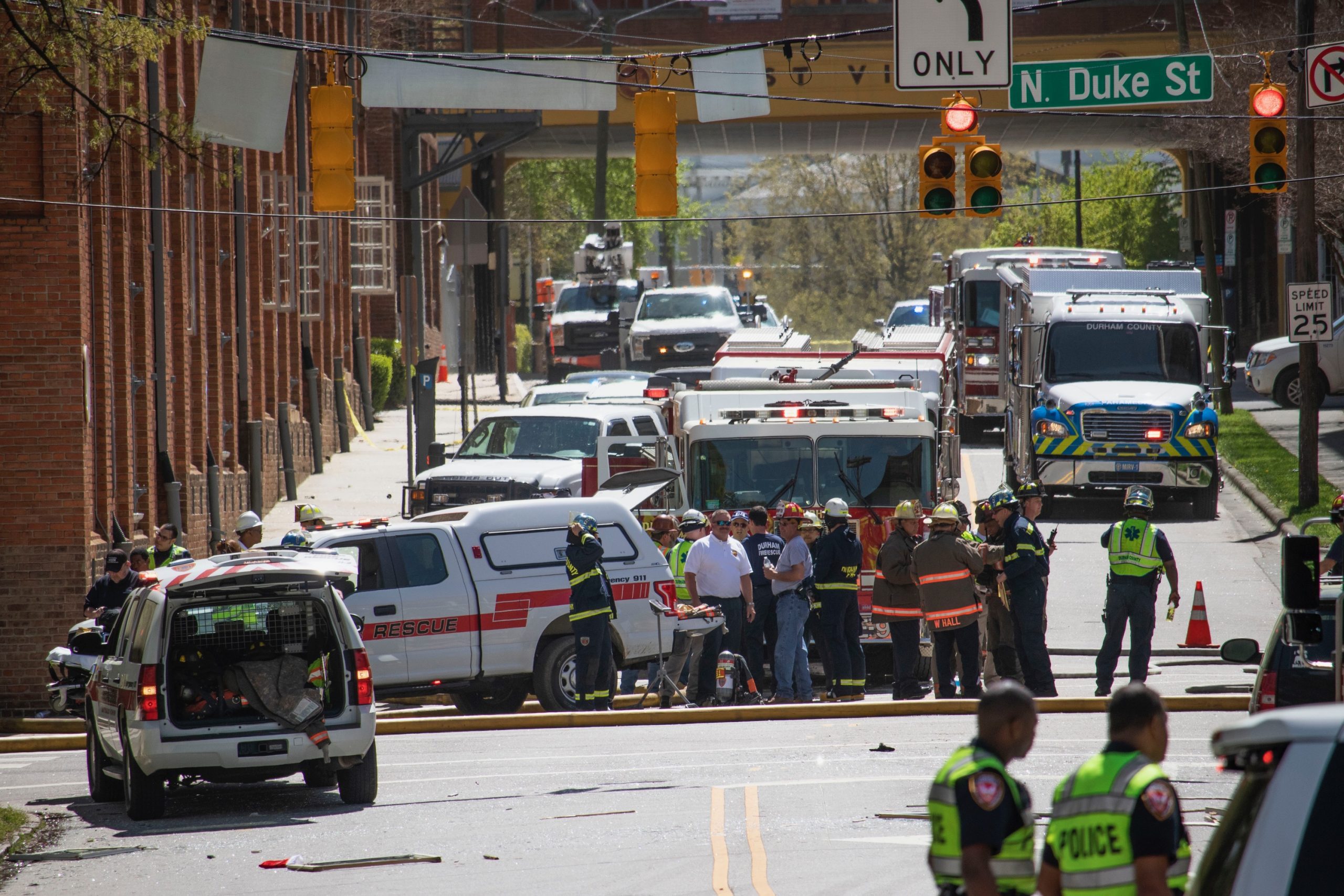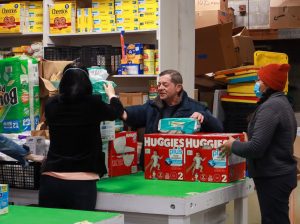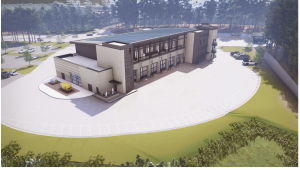Nearly a year ago, a natural gas pipeline exploded in downtown Durham, killing two people, injuring 25 others and damaging more than a dozen buildings.
One of those buildings was Saint James Seafood. When the pipeline blew up, the restaurant’s glass windows shattered and gold chandeliers crashed to the ground.
After 10 months of work repairing the building and worrying what the future held for him and his employees, Saint James owner Matt Kelly reopened the restaurant in late January.
He held a dinner for first responders who were there the day of the explosion to thank them for risking their lives.
“I don’t think anyone could ask more of what that group of people did that day,” he said.
Those responders say they’ve learned from the disaster and have outlined ways to help prevent it from happening again.
In November, Durham County Emergency Management released a “Lessons Learned Report” about policy changes that have taken place since the deadly explosion, including improving communication with the public and other agencies in times of disaster and educating the public and responders about natural gas as downtown Durham grows.
“The way that Durham’s building up, it is kind of changing our way of thinking, knowing that we’ve got a huge shift in population to downtown and everything that goes along with that,” said Jim Groves, the city’s emergency management director.
Natural gas pipeline leaks and incidents are fairly common throughout the U.S.; most are caused by excavation work like digging utility lines, according to the U.S. Department of Transportation. North Carolina has had 44 natural gas-related pipeline incidents in the past 20 years, but April’s explosion were the first deaths ever recorded in the state.
While laying fiber optic cable on North Duke Street on the morning of April 10, 2019, Optic Cable Technology hit a ¾-inch natural gas pipeline distribution line at the intersection of North Duke Street and West Main Street, causing a gas leak.
About an hour later, the pipeline exploded, nearly leveling the block. Kaffeinate coffee shop owner Kong Lee was killed, and Jay Rambeaut, a PSNC Energy worker, died two weeks later.
A Durham fire department investigation found that the explosion was an accident. But the contractors working that day faced some responsibility: The North Carolina Labor Department fined Optic Cable Technology $7,000 for failing to immediately contact authorities after damaging the line, and another $7,000 for failing to dig a test hole to determine where the pipeline was.
The agency also fined PS Splicing $2,100 for failing “to perform frequent and regular inspections of the site” and PSNC Energy, a subsidiary utility of Dominion Energy, $5,000 for “ineffective response procedures” that exposed a first responder to fire and hazards. The energy company disagreed with the state’s findings.
The fire department’s report stated that communication systems between city, county, and state agencies about such incidents need to improve. Groves said that on the day of the explosion, Durham public information officials were distracted by the city’s 150th anniversary celebration party downtown, which slowed communication with the public. The delay in reporting the leak made response difficult and more dangerous.
City and county managers have also developed an initiative for a joint crisis communication plan to more efficiently and uniformly release emergency information to the public through social media and public information officers—a process that was too chaotic on the day of the explosion, according to officials.

Still, city policies for the supervision of contractors working near natural gas lines “haven’t changed” since the explosion, said Durham city manager Thomas Bonfield. The state government has jurisdiction over underground development like laying fiber, so the county and city have no authority to send inspectors to monitor work more closely, he said.
Groves said he wants Durham residents to feel safe downtown, because although natural gas lines can burst or leak, they can typically be prevented if they are reported immediately.
He said if people “smell [gas], or if they hear a loud hissing, when they call 911 and law enforcement gets there and they give them directions to evacuate — listen and take immediate action.”
Durham Fire Department chief Robert Zoldos said the fire department came up with 11 points of improvement since the explosion, including more training for hazardous materials situations like the pipeline leak and assigning full time drivers to the hazmat units.
The department also reopened a downtown fire department unit, Rescue One, which specializes in rescues above general expectations of a firefighter, including hazardous material cases.
“All of those things will provide us with a little better response than we had before—not perfect, but much better than we had,” Zoldos said.
The Lessons Learned Report offered some closure to Saint James and other businesses.
“When that came out it was definitely a relief that there was a direction of some blame and that what happened was very thoroughly investigated,” Kelly said.
The block remains quiet since several businesses in the area are still closed. The United Way of the Greater Triangle is hosting fundraisers and looking for grants to help businesses get back on their feet. Kelly said he and others are optimistic the city can keep moving forward.
“We encourage people to come back,” Kelly said. “The Brightleaf area really just wants normalcy, and we’re waiting for our friends next door, Torero’s, to reopen, and get this block back in business.”
Top Photo: Emergency responders on the scene of the April 10, 2019 fatal natural gas pipeline explosion in downtown Durham. Photo by Katie Nelson
Kathleen Hobson







Comments are closed.